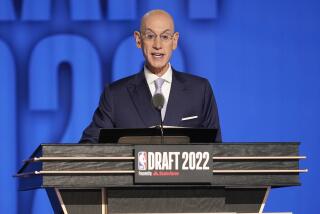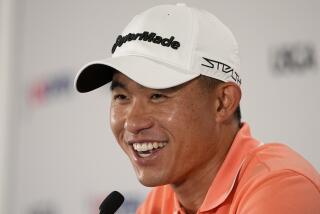Morning Briefing: Hank Haney tees up the complaints with his remarks
- Share via
Hank Haney is a famous golf coach who at one point instructed Tiger Woods and Mark O’Meara on how to improve their game. He also once had a show on the Golf Channel where he tried to improve the games of celebrities. But now, he may find it hard to line up new clients.
Haney was hosting his SiriusXM radio show Wednesday morning when his co-host, Steve Johnson, asked him whom he though would win the U.S. Women’s Open this week. That led to this exchange:
Haney: “I’m gonna predict a Korean.”
Johnson: “That’s a pretty safe bet.”
Haney: “That’s gonna be my prediction. I couldn’t name you, like, six players on the LPGA Tour. Nah, maybe I could. Well, I’d go with Lee. If I didn’t have to name a first name, I’d get a bunch of them right. I don’t know. Lexi Thompson. Michelle Wie’s hurt. I don’t know that many.”
The complaints began almost immediately. Many notable LPGA names sent tweets, including Wie, who is sidelined with a wrist injury. She tweeted, “As a Korean American female golfer, these comments that @HankHaney made disappoint and anger me on so many different levels. Racism and sexism are no laughing matter Hank....shame on you. I don’t ever do this, but this must be called out. Too many of these girls, Korean or not, have worked countless hours and sacrificed so much to play in the US Open this week. There are so many amazing players in the field. Let’s celebrate them....Not mock them.”
The outpouring of disgust led to an apology from Haney, again via Twitter:
“This morning I made some comments about women’s professional golf and its players that were insensitive and that I regret. In an effort to make a point about the overwhelming success of Korean players on the tour I offended people and I am sorry. I have the highest respect for the women who have worked so hard to reach the pinnacle of their sport and I never meant to take that away from their abilities and accomplishments. I’ve worked in the game with men and women players from many different cultures and I look forward to continuing to do so.”
Will the apology be enough? Time will tell.
Whoops
The NCAA has a new rule that allows college basketball players to sign with an agent to help them investigate their NBA draft potential. If the player withdraws from the draft by a certain date, he can return to his school with no harm done.
Phil Bledsoe from Division II Glenville State in West Virginia followed those rules. He decided that being in the draft this year wasn’t a good move for him, so he withdrew his name before Wednesday night’s deadline. No harm, no foul, right?
Well, it turns out the rule only applies to Division I players.
“This didn’t need to happen,” Bill Lilly, the compliance coordinator at Glenville State, who was advising Bledsoe on what to do, told the Associated Press. “I could’ve avoided it, but we could’ve had help in avoiding this thing, too, because we weren’t trying to sneak anything by anyone. We were just trying to give the kid the option we thought he had, and now he doesn’t have it.”
In the statement to the Associated Press, NCAA spokeswoman Stacey Osburn, although declining to discuss Bledsoe specifically, said that players could “work through existing processes to seek potential solutions,’’ which means Bledsoe can appeal the case through the proper administrative channels. Schools in Divisions II and III are supposed to “evaluate the impact’’ of the new rule, Osburn said, and consider whether to adopt it after this year’s draft.
None of which helps Bledsoe, who can still go to Glenville State but can’t play basketball for them now.
“You just don’t think of this being separated between I’s, II’s and III’s, and if so, why?” Lilly said. “What’s the purpose of not allowing a Division II kid to have the same opportunity a Division I kid has?”
That’s a good question. Here’s another one: Why doesn’t the school’s compliance officer actually read the rule instead of assuming?
More to Read
Go beyond the scoreboard
Get the latest on L.A.'s teams in the daily Sports Report newsletter.
You may occasionally receive promotional content from the Los Angeles Times.











